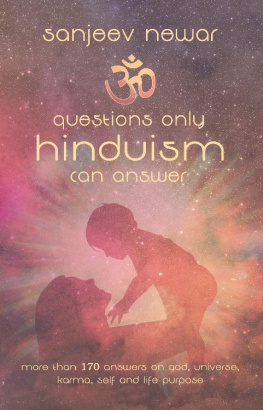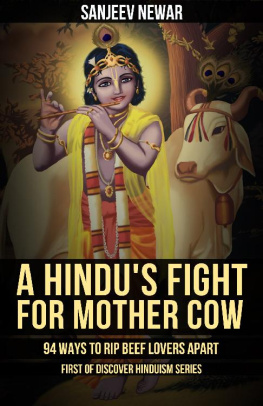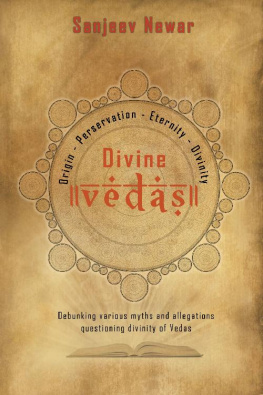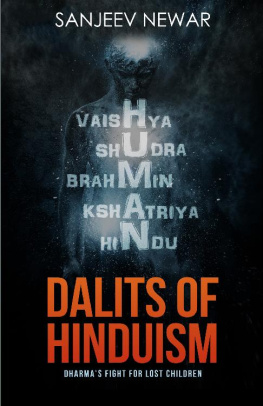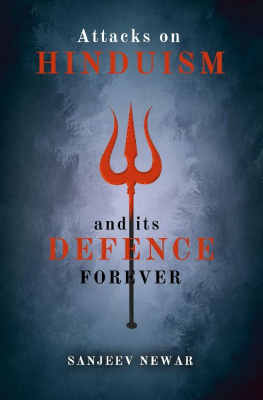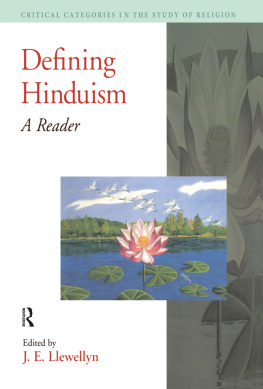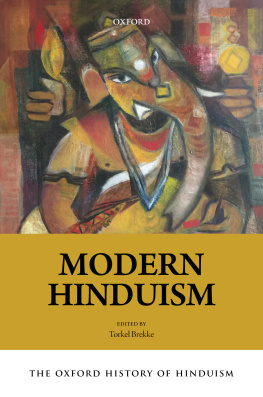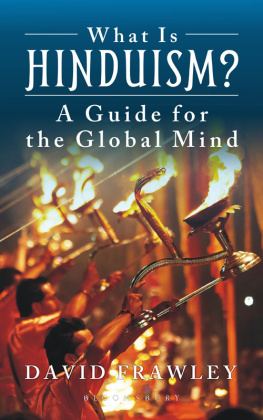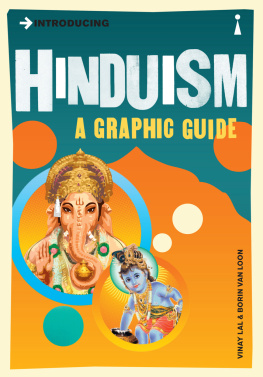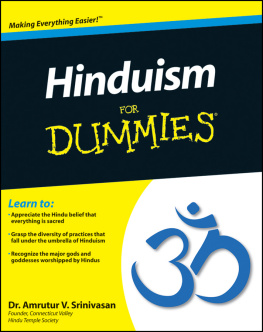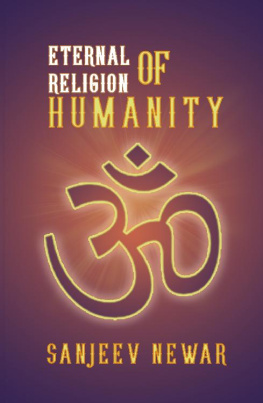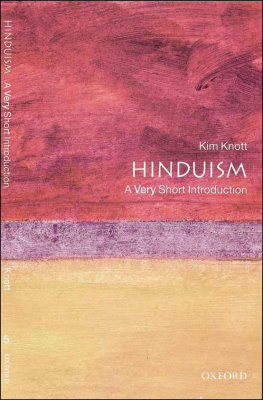Questions only
Hinduism
Can Answer
Sanjeev Newar
Questions Only Hinduism Can Answer
Copyright 2017 by Agniveer
All rights reserved. This publication may not be reproduced, stored in a retrieval system, or transmitted in whole or in part, in any form or by any means, electronic, mechanical, photocopying, recording, or otherwise, without the prior written permission of Agniveer.
This publication is designed to provide accurate and authoritative information in regard to the subject matter covered.
For information contact
books@agniveer.com
Book Design and Composition by Ronak Trivedi
First Edition: March 2017
Preface
Why am I?
What to do?
What is the Purpose of life?
Does God exist?
If yes, why did (S)he create me?
Which religion is true?
Every kid raises these questions in their mind. But slowly, they are silenced by the laws of blasphemy. Because in most religions, asking questions is an insult to God. Customs replace questions. Fear of blasphemy replaces the quest for truth.
When you are surrounded with blasphemies and fear, Hinduism comes for the rescue. You may not question your God. But Hindu God invites you to question Her. Talk to Her. Mock Her. And even reject Her. There is no blasphemy. Reject if you don't get answers. Accept if you like it.
In religions, you are slaves of God. In Hinduism, you are a child of God. In religions, you fear hell and do 'good' out of fear. In Hinduism, you love Mother God and do good out of love. Hinduism is all about holding Supreme's hands and talk, love, laugh, question, joke and walk together. When you get tired, the mother picks you up in her arms and walks. When you get stuck, mother rescues.
This book deals with 170+ questions that every religion tried to answer but failed. And you would know why they failed. Because its not about finding answers, Its about finding mother's lap where all questions vanish...
Sanjeev Newar
March 2017, New Delhi, India
Table of Contents
QUESTIONS ON
CONCEPT OF GOD
Question
Who is God?
There can be a variety of definitions of God. Being limitless and beyond the ranchealm of physical senses, it is difficult to capture the meaning of God in a few words or sentences. A reasonably decent definition would be as follows:
God is (Sachidanand) - existent, intelligent and blissful.
He is (Nirakaar) formless.
He is (Sarvashaktimaan) all powerful.
He is (Sarvajna) omniscient.
He is (Nyayakari) just.
He is (Dayalu) merciful.
He is (Ajanma) unborn.
He is (Anant) endless.
He is (Nirvikaar) - unchangeable & faultless.
He is (Anadi) beginning-less.
He is (Anupam) unequaled.
He is (Sarvadhar) the support of all.
He is (Sarveshwar) the master of all.
He is (Sarvayapak) omnipresent.
He is (Sarvantaryami) immanent.
He is (Ajar) un-aging.
He is (Amar) immortal.
He is (Abhay) fearless.
He is (Nitya) eternal.
He is (Pavitra) holy and
He is (Srishtikarta) the maker of all.
But that is next step. To begin with, it is sufficient to understand that God is the manager of the world around and within.
This can be deciphered through a systematic process of evaluation of life and world. And once we are able to initiate this process of analysis, the rest of the adjectives of God would become clear automatically.
Let me tell you what Rigveda says about this supreme entity.
Rigveda 1/164/30
The Supreme One, who represents selflessness, controls the entire universe, is present everywhere and is the Devata of all Devatas, is alone a source of bliss. Those who do not understand Him remain drenched in sorrow and those who realize Him achieve unconditional happiness.
Question
Ok, so how many Gods are there in Vedas? We have heard that there are many Gods in Vedas.
Vedas clearly specify that there is One and only One God. There is no mantra in Vedas that can be interpreted to imply multiple Gods.
Not only this, but Vedas also refuse the existence of any angel or Prophet or incarnation who is necessarily required to act as an agent between God and us.
To give a rough analogy:
Ishwar of Vedas = God of Christianity minus the concept of Trinity minus the necessity to surrender to Jesus
Ishwar of Vedas = Allah of Islam minus the necessity to accept Muhammad as final Prophet.
In other words, If someone says the first part of Shahada: l ilha illallh (There is no another God except one and only Allah) but rejects the second part: Mu ammadur raslullh (Muhammad is his messenger), that is close to the concept of Vedic God.
In Islam, it is Shirk or greatest sin to worship anything except Allah. If you take this concept further and also refuse to accept any Muhammad or Gabriel as necessary to remember apart from Allah, you are avoiding Shirk as per Vedas.
Question
What about the various Devatas mentioned in Vedas? What about 33 crore Gods?
Devata is a different term but often wrongly considered to mean Supreme Entity. Any entity living or non-living that helps us or is useful to us is called Devata. But that does not mean every entity is Ishwar (God), and we should worship them. Vedas nowhere mention that we should worship these entities. God is the Devata of all Devatas, and hence, he is called Mahadeva. Therefore, he alone is to be worshiped.
The Vedas refer to not 33 crore Devatas but 33 types (Koti in Sanskrit) of Devatas. They are explained in Shatpath Brahman very clearly. These include
- 8 Vasus: Earth, Water, Fire, Air, Sky, Moon, Sun, Stars/ Planets, which form components of the universe where we live.
- 11 Rudras: 10 Life Forces in our body or Prana: Prana, Apana, Vyana, Udana, Samaana, Naga, Kurma, Kukala, Devadatta, Dhananjay and 1 Soul
- 12 Aditya: 12 months of year
- 1 Vidyut: Electromagnetic force that is of tremendous use to us
- 1 Yajna: Constant noble, selfless deeds done by humans
The master of these 33 Devatas is the Mahadeva or Ishwar/God, who alone is to be worshiped as per 14th Kanda of Shatpath Brahman.
The concept of 33 Devatas is a great research based subject in itself and requires in-depth study for proper understanding. However, it has been made very clear in all Vedic texts that they are NOT Gods and hence NOT to be worshiped.
God has a huge number of properties. Ignorant people wrongly consider these properties of God to be different Gods. For example, in the newspaper, there were two headlines One referred to Narendra and other to Modi. That does not mean India had two Prime Ministers!
Question
Can you provide Mantras from Vedas that state that there is One and only One God?
There are several mantras in Vedas that clearly state that there is One and Only One God without any assistants, agents, prophets or juniors to liaison between Him and Us. For example:
Yajurveda 40/1
This entire world is embedded within and managed by the One and Only One Ishwar. Never dare do any injustice or dare to desire riches through unjust means. Instead, follow the righteous path and enjoy his bliss. After all, He alone is a source of all bliss!
Rigveda 10/48/1
Ishwar alone is omnipresent and manager of the entire universe. He alone provides victory and eternal cause of the world. All souls should look up only to Him in the same manner as children look up to their Father. He alone provides for our sustenance and bliss.
Rigveda 10/48/5
Ishwar enlightens the entire world. He is undefeated and undying. He is the creator of the world. All souls should seek bliss through seeking knowledge and act thereupon. They should never shun the friendship of Ishwar.
Next page
